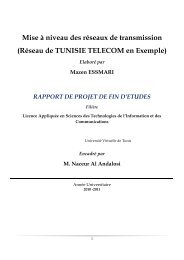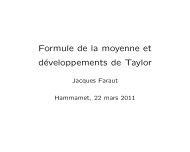- Page 1 and 2: Université Paris Diderot (Paris 7)
- Page 3 and 4: Remerciements Ce travail a été r
- Page 5 and 6: IV. 2. 3. Notions de bijections et
- Page 7 and 8: III. 6. Question 6 ……………
- Page 9 and 10: XII. 3. 1. Evolution des aptitudes
- Page 11 and 12: A l’entrée à l’université, l
- Page 13 and 14: place primordiale dans l’apprenti
- Page 15 and 16: 2) Comment est organisé l’enseig
- Page 17 and 18: êver, etc.). De même, un objet O
- Page 19 and 20: varie selon l’institution, et en
- Page 21 and 22: Contrairement au Secondaire, dans l
- Page 23 and 24: construction des connaissances, du
- Page 25 and 26: Selon Dubinsky, dans des situations
- Page 27 and 28: intériorisées, des définitions p
- Page 29 and 30: « This move from the embodied “c
- Page 31 and 32: comme « formal procept » ne peut
- Page 33 and 34: 1 d’une fonction f continue et st
- Page 35: l’institution ES, dans l’instit
- Page 39 and 40: manque d’articulation entre thèm
- Page 41 and 42: - niveau de OM t-convoquée, où le
- Page 43 and 44: este caractérisée par la fragilit
- Page 45 and 46: - comme défauts d’interprétatio
- Page 47 and 48: i 2 ) Existence de techniques alter
- Page 49 and 50: elativement complètes afin d’att
- Page 51 and 52: Le test diagnostique et le test d
- Page 53 and 54: Chapitre II : Rapports des institut
- Page 55 and 56: quinze 21 sur vingt. Les programmes
- Page 57 and 58: c 3 ) Présence d’éléments tech
- Page 59 and 60: Comprendre les différents points q
- Page 61 and 62: Diagramme 1 : Grille d’analyse de
- Page 63 and 64: Tableau 1 : La notion d’applicati
- Page 65 and 66: Tableau 2 : La notion d’applicati
- Page 67 and 68: Tableau 3 : Notion de fonction cont
- Page 69 and 70: La distinction que fait cette défi
- Page 71 and 72: Commentaire L’importance accordé
- Page 73 and 74: géométriques sont étudiées sous
- Page 75 and 76: Tableau 5 : Tables des opérations
- Page 77 and 78: les fonctions composant la fonction
- Page 79 and 80: opérations. Dans ces cas là, la t
- Page 81 and 82: L’usage de ces notions est fréqu
- Page 83 and 84: Exemple 2 (p. 76) : Propriété Deu
- Page 85 and 86: Théorème 1 (p. 92) : Théorème S
- Page 87 and 88:
Commentaire Nous remarquons que pou
- Page 89 and 90:
de tâches où elles sont utilisée
- Page 91 and 92:
invisibles dans la solution donnée
- Page 93 and 94:
Soit ϕ une isométrie. Ont dit qu
- Page 95 and 96:
propriétés ensemblistes intervien
- Page 97 and 98:
Exercice 2 (ibid. p. 209) : Exercic
- Page 99 and 100:
Tableau 7 : Synthèse de l’étude
- Page 101 and 102:
théorèmes de cours. Pour la bijec
- Page 103 and 104:
Diagramme 2 : Modèle d’analyse d
- Page 105 and 106:
Exercice 3 (p. 63) 1- Ecrire l’ex
- Page 107 and 108:
Type de tâches T 3 : Déterminer u
- Page 109 and 110:
- Dans 1-b, gof est un antidéplace
- Page 111 and 112:
- Pour caractériser l’antidépla
- Page 113 and 114:
Dans cet exercice, nous considéron
- Page 115 and 116:
techniques ou la stratégie adopté
- Page 117 and 118:
des connaissances géométriques et
- Page 119 and 120:
L’élève ici est autonome, il do
- Page 121 and 122:
Exercice 13 (Exercice 2 de l’exam
- Page 123 and 124:
Tableau 10 : Niveaux de mise en fon
- Page 125 and 126:
1 T 7 : Calcul de l’antécédent
- Page 127 and 128:
2005) Exercice 16 (Extrait du probl
- Page 129 and 130:
Commentaire L’objectif de cette p
- Page 131 and 132:
Taches/Type de taches Tableau 13 :
- Page 133 and 134:
théorique d’usage n’est pas ex
- Page 135 and 136:
traditionnellement par le chapitre
- Page 137 and 138:
4) Notion de bijection Contexte Gé
- Page 139 and 140:
Exercice 1 (Série n° 1, 2005/2006
- Page 141 and 142:
Question 2 Cette question fait inte
- Page 143 and 144:
Deux stratégies sont ici possibles
- Page 145 and 146:
Outre la connaissance de la défini
- Page 147 and 148:
d’erreurs. Les principales connai
- Page 149 and 150:
se situe dans le domaine de l’alg
- Page 151 and 152:
V. 3. Conclusion concernant le rapp
- Page 153 and 154:
considération du contenu conceptue
- Page 155 and 156:
Diagramme 3 : Correspondance Praxé
- Page 157 and 158:
nous-mêmes l’enseignement du cou
- Page 159 and 160:
Exemple 1 A la question : Qu’est
- Page 161 and 162:
II. 2. 1. 2. Analyse des production
- Page 163 and 164:
correspondance dans l’enseignemen
- Page 165 and 166:
1) f : [ 0 ,8] → [ 1 ,20] Tableau
- Page 167 and 168:
au lycée (dans le cours ou dans le
- Page 169 and 170:
étudiants ayant donné ce type de
- Page 171 and 172:
Tableau 12 : Réponses correctes de
- Page 173 and 174:
Commentaire Remarquons d’abord qu
- Page 175 and 176:
II. 2. 2. Le deuxième exercice II.
- Page 177 and 178:
Tableau 14 : Réponses relatives à
- Page 179 and 180:
Tableau 15 : Réponses relatives à
- Page 181 and 182:
Tableau 16 : Réponses relatives à
- Page 183 and 184:
les étudiants pour l’étude de l
- Page 185 and 186:
d’elles) sont nécessaires pour q
- Page 187 and 188:
Cette stratégie se réfère au th
- Page 189 and 190:
Commentaire Pour l’étude de la b
- Page 191 and 192:
Commentaire Pour cette tâche, il y
- Page 193 and 194:
Tableau 20 : Répartition des répo
- Page 195 and 196:
Tableau 21 : Répartition des solut
- Page 197 and 198:
Copie 4 (Solution fonctionnelle : C
- Page 199 and 200:
Copie 6 (Solution fausse) Ici, la j
- Page 201 and 202:
Dans cette copie, on ne voit pas l
- Page 203 and 204:
Ces conclusions se trouvent en corr
- Page 205 and 206:
III. 1. 2. Contexte de l’expérim
- Page 207 and 208:
Pour les analyses qui suivent, nous
- Page 209 and 210:
Production 3 (Copie 37) Nous retrou
- Page 211 and 212:
Question 1-b. (Tâche T 2 ) b- En d
- Page 213 and 214:
Ceci étant, nous rapportons ci-des
- Page 215 and 216:
Production 12 (Copie 4) Pour montre
- Page 217 and 218:
ici. Nous retrouvons ce type d’er
- Page 219 and 220:
Production 18 (Copie 4) Ici, l’é
- Page 221 and 222:
la technique choisie et de savoir g
- Page 223 and 224:
Production 24 (Copie 25) Il semble
- Page 225 and 226:
Production 28 (Copie 36) Dans cette
- Page 227 and 228:
Tableau 25 : Répartition des répo
- Page 229 and 230:
) Analyse des productions des étud
- Page 231 and 232:
Production 37 (Copie 38) Dans ces 3
- Page 233 and 234:
Tableau 26 : Répartition des répo
- Page 235 and 236:
définitions (tâches T 4 et T 5 )
- Page 237 and 238:
III. 2. 2. 1. Exercice 2, partie B.
- Page 239 and 240:
Production 42 (Copie 24) 239
- Page 241 and 242:
Réponses fausses Comme nous l’av
- Page 243 and 244:
Production 47 (Copie 41) Dans les c
- Page 245 and 246:
Production 48 (Copie 20) Dans d’a
- Page 247 and 248:
entre un morphisme de groupes et un
- Page 249 and 250:
Commentaire pour la question 2 (2
- Page 251 and 252:
isomorphisme entre (H ,× ) et un g
- Page 253 and 254:
Production 55 (Copie 24) Ici, l’
- Page 255 and 256:
Production 57 (Copie 17) Remarquons
- Page 257 and 258:
Production 59 (Copie 9) Dans cette
- Page 259 and 260:
Commentaire pour la question 1 (3
- Page 261 and 262:
Production 64 (Copie 5) 261
- Page 263 and 264:
Commentaire pour la question 2 (3
- Page 265 and 266:
modifient altèrent pas la pertinen
- Page 267 and 268:
Réponses correctes de type C- Ces
- Page 269 and 270:
Production 72 (Copie 5 ) L’étudi
- Page 271 and 272:
Production 74 (Copie 4) Dans cette
- Page 273 and 274:
Production 76 (Copie 27) Dans cette
- Page 275 and 276:
Tableau 33 : Répartition des répo
- Page 277 and 278:
espectifs de x et de θ . La varié
- Page 279 and 280:
étudiées, accroissent la brutalit
- Page 281 and 282:
est susceptible de variations indiv
- Page 283 and 284:
Analyse et commentaire Les réponse
- Page 285 and 286:
Comprendre le cours Tableau 2 Compr
- Page 287 and 288:
Castela (2008a) trouve nécessaire
- Page 289 and 290:
Jamais Rarement Souvent Toujours Ob
- Page 291 and 292:
cette question vise à étudier les
- Page 293 and 294:
difficultés à surmonter individue
- Page 295 and 296:
3) Ce qui me paraît difficile en a
- Page 297 and 298:
deux types, celles attribuées au s
- Page 299 and 300:
Les productions des étudiants dans
- Page 301 and 302:
scientifiques » aux notions ensemb
- Page 303 and 304:
Notons que vu la vocation de l’in
- Page 305 and 306:
Le premier type concerne les probl
- Page 307 and 308:
permettra de prévoir les processus
- Page 309 and 310:
3) H est un hyperplan de E Cette hy
- Page 311 and 312:
- En utilisant la reformulation R 2
- Page 313 and 314:
Sous-tâche (2.1) : Choix d’une
- Page 315 and 316:
choix qui pourraient être sources
- Page 317 and 318:
V. 2. 1. Période de réflexion Dé
- Page 319 and 320:
L’enseignant intervient : P 75 :
- Page 321 and 322:
intervention, et avec un retour sur
- Page 323 and 324:
faut dépasser ce stade pour avance
- Page 325 and 326:
contraintes de l’exercice. Nous n
- Page 327 and 328:
Analyse Dans la première page, les
- Page 329 and 330:
l’image de x par f. Il y a là un
- Page 331 and 332:
Pas de raisonnement Commentaires P
- Page 333 and 334:
Copie 6 (groupe 4, page 1) . Copie
- Page 335 and 336:
Pas de raisonnement Commentaires P
- Page 337 and 338:
on a utilisé que H=Kerf pour donne
- Page 339 and 340:
[42] P : effectivement, f n’est p
- Page 341 and 342:
E 8 écrit au tableau : Si x ∈ E.
- Page 343 and 344:
Nous déduisons de ces observations
- Page 345 and 346:
Première question La première que
- Page 347 and 348:
(ii) ϕ vérifie les propriétés d
- Page 349 and 350:
Fixer une stratégie de travail Str
- Page 351 and 352:
Remarquons que dans la troisième l
- Page 353 and 354:
d’implication et d’équivalence
- Page 355 and 356:
Copie 2 (groupe 1) Analyse Pour dé
- Page 357 and 358:
Copie 3 (groupe 2) Analyse Les étu
- Page 359 and 360:
Copie 4 (groupe 3) 359
- Page 361 and 362:
Groupe 4 (composé par : E 12 > M)
- Page 363 and 364:
Groupe 1 (composé par : E 1 , E 3
- Page 365 and 366:
Pour établir la condition suffisan
- Page 367 and 368:
Analyse Les deux conditions, néces
- Page 369 and 370:
Commentaire Contrairement à leur r
- Page 371 and 372:
L’absence de parenthèses regroup
- Page 373 and 374:
[20] P : et pour la surjectivité ?
- Page 375 and 376:
[48] P : pas exactement, car parler
- Page 377 and 378:
professeur que les étudiants ont r
- Page 379 and 380:
l’existence de difficultés rési
- Page 381 and 382:
composante pratique de la praxéolo
- Page 383 and 384:
eformulations et/ou de pas de raiso
- Page 385 and 386:
tâche T selon cette piste requiert
- Page 387 and 388:
la difficulté serait de se placer
- Page 389 and 390:
Autres pistes de résolution Piste
- Page 391 and 392:
Comme nous l’avons indiqué dans
- Page 393 and 394:
Production 1, page 1 (Groupe 1) 393
- Page 395 and 396:
l’enseignant, les étudiants essa
- Page 397 and 398:
Production 2 (Groupe 1) 397
- Page 399 and 400:
Commentaire Le travail accompli dan
- Page 401 and 402:
Suite de la production 1 (Groupe 2)
- Page 403 and 404:
Production 2 (Groupe 2) Analyse Dan
- Page 405 and 406:
Commentaire Les précisions ajouté
- Page 407 and 408:
Analyse Dans cette production, les
- Page 409 and 410:
Suite de la production 2 (Groupe 3)
- Page 411 and 412:
d’un espace vectoriel G de dimens
- Page 413 and 414:
Extrait de la production 3 (Groupe
- Page 415 and 416:
général aussi, la linéarité de
- Page 417 and 418:
ont établie dans le cas de dimensi
- Page 419 and 420:
X. Deuxième séance de remédiatio
- Page 421 and 422:
pourrait soit admettre que c’est
- Page 423 and 424:
τ 2 : Montrer que l’application
- Page 425 and 426:
Conclusion L’exercice proposé da
- Page 427 and 428:
Suite de la production 1 (Groupe 1)
- Page 429 and 430:
comme contraintes sur g. Dans ces c
- Page 431 and 432:
Analyse Dans cette deuxième produc
- Page 433 and 434:
X. 3. 2. Analyse des productions du
- Page 435 and 436:
tout réel t associe x =h(t). Fonct
- Page 437 and 438:
Suite de la production 2 (Groupe 2)
- Page 439 and 440:
terminer. L’avantage que constitu
- Page 441 and 442:
X. 3. 3. Analyse des productions du
- Page 443 and 444:
) Analyse de la production 2 Produc
- Page 445 and 446:
Commentaire Comme nous l’avons re
- Page 447 and 448:
ase canonique de Mn(R), définie da
- Page 449 and 450:
Nous déterminons ci-dessous les é
- Page 451 and 452:
ψ : M n(R) A M n(R)* Ψ (A) : Mn(R
- Page 453 and 454:
vérifiant ϕ ( M) = tr(AM) pour to
- Page 455 and 456:
XI. 2. Déroulement de l’expérim
- Page 457 and 458:
Réponse question 1, page 2 (Groupe
- Page 459 and 460:
Réponse question 1, page 4 (Groupe
- Page 461 and 462:
intéressés à démontrer ces cond
- Page 463 and 464:
Réponse question 2, page 2 (Groupe
- Page 465 and 466:
aisonnement produits. Ceci marque d
- Page 467 and 468:
Analyse Réponse question 1, page 2
- Page 469 and 470:
établir les conditions conduisant
- Page 471 and 472:
Avec cette double correspondance, l
- Page 473 and 474:
de raisonnement et une certaine ma
- Page 475 and 476:
Analyse Réponse, question 1, page
- Page 477 and 478:
Réponse, question 2 (Groupe 3) 477
- Page 479 and 480:
membres de l’équation comme deux
- Page 481 and 482:
XII. Conclusion générale de l’i
- Page 483 and 484:
Exploration de l’espace de résol
- Page 485 and 486:
Commentaire Il ressort de ces table
- Page 487 and 488:
Tableau 13 : Aptitudes relatives à
- Page 489 and 490:
Nous récapitulons les résultats c
- Page 491 and 492:
l’énoncé et ont réussi à surm
- Page 493 and 494:
Tableau 19 : Aptitudes relatives à
- Page 495 and 496:
concernant les difficultés constat
- Page 497 and 498:
vers ces classes devant les difficu
- Page 499 and 500:
surtout locales, intervenant au niv
- Page 501 and 502:
deuxième point, les réponses des
- Page 503 and 504:
l’apprentissage de connaissances
- Page 505 and 506:
découle de notre recherche est une
- Page 507 and 508:
Bibliographie [1] Arsac, G. (1996).
- Page 509 and 510:
[32] Dias, M.A. (1998) : Les probl
- Page 511 and 512:
[64] Tall, D. (2008) : The transiti
- Page 513 and 514:
Exercice 1 (p. 100) ∧ π Soit ABC
- Page 515 and 516:
515
- Page 517 and 518:
517
- Page 519 and 520:
519
- Page 521 and 522:
521
- Page 523 and 524:
523
- Page 525 and 526:
I.P.E.I.T Série d’Algèbre n o 1
- Page 527 and 528:
I.P.E.I.T Série d’Algèbre n o 5
- Page 529 and 530:
I.P.E.I.T Série d’Algèbre n o 8
- Page 531 and 532:
2. Montrer que si k est différent
- Page 533 and 534:
I.P.E.I.T Devoir surveillé d’alg
- Page 535:
I.P.E.I.T Examen d’algèbre n o 2

















